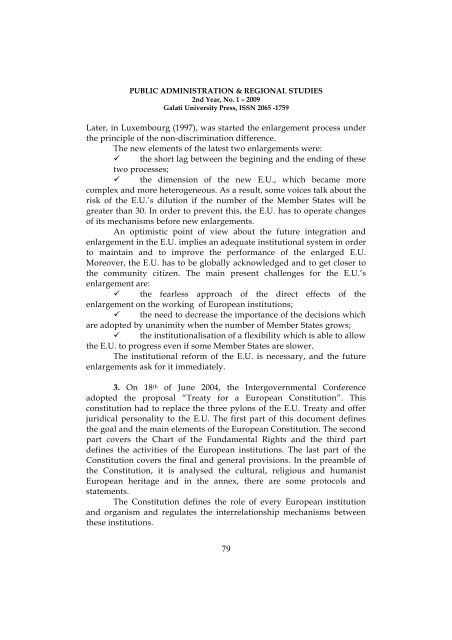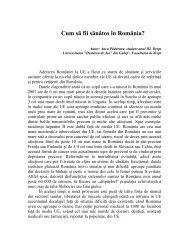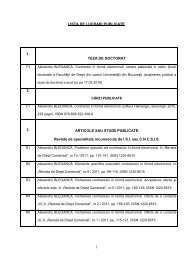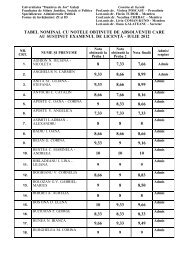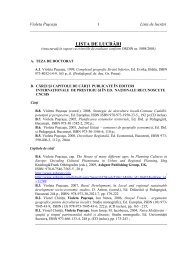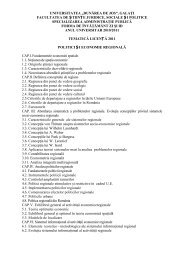regional studies public administration - Facultatea de Drept ...
regional studies public administration - Facultatea de Drept ...
regional studies public administration - Facultatea de Drept ...
You also want an ePaper? Increase the reach of your titles
YUMPU automatically turns print PDFs into web optimized ePapers that Google loves.
PUBLIC ADMINISTRATION & REGIONAL STUDIES<br />
2nd Year, No. 1 – 2009<br />
Galati University Press, ISSN 2065 -1759<br />
Later, in Luxembourg (1997), was started the enlargement process un<strong>de</strong>r<br />
the principle of the non-discrimination difference.<br />
The new elements of the latest two enlargements were:<br />
the short lag between the begining and the ending of these<br />
two processes;<br />
the dimension of the new E.U., which became more<br />
complex and more heterogeneous. As a result, some voices talk about the<br />
risk of the E.U.’s dilution if the number of the Member States will be<br />
greater than 30. In or<strong>de</strong>r to prevent this, the E.U. has to operate changes<br />
of its mechanisms before new enlargements.<br />
An optimistic point of view about the future integration and<br />
enlargement in the E.U. implies an a<strong>de</strong>quate institutional system in or<strong>de</strong>r<br />
to maintain and to improve the performance of the enlarged E.U.<br />
Moreover, the E.U. has to be globally acknowledged and to get closer to<br />
the community citizen. The main present challenges for the E.U.’s<br />
enlargement are:<br />
the fearless approach of the direct effects of the<br />
enlargement on the working of European institutions;<br />
the need to <strong>de</strong>crease the importance of the <strong>de</strong>cisions which<br />
are adopted by unanimity when the number of Member States grows;<br />
the institutionalisation of a flexibility which is able to allow<br />
the E.U. to progress even if some Member States are slower.<br />
The institutional reform of the E.U. is necessary, and the future<br />
enlargements ask for it immediately.<br />
3. On 18 th of June 2004, the Intergovernmental Conference<br />
adopted the proposal “Treaty for a European Constitution”. This<br />
constitution had to replace the three pylons of the E.U. Treaty and offer<br />
juridical personality to the E.U. The first part of this document <strong>de</strong>fines<br />
the goal and the main elements of the European Constitution. The second<br />
part covers the Chart of the Fundamental Rights and the third part<br />
<strong>de</strong>fines the activities of the European institutions. The last part of the<br />
Constitution covers the final and general provisions. In the preamble of<br />
the Constitution, it is analysed the cultural, religious and humanist<br />
European heritage and in the annex, there are some protocols and<br />
statements.<br />
The Constitution <strong>de</strong>fines the role of every European institution<br />
and organism and regulates the interrelationship mechanisms between<br />
these institutions.<br />
79


